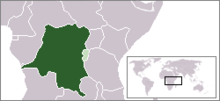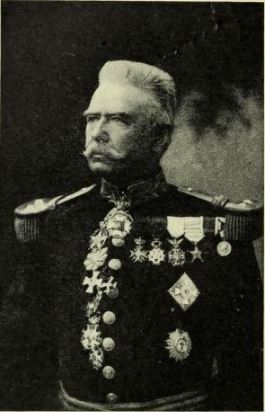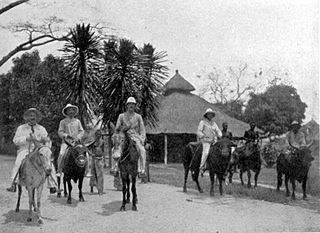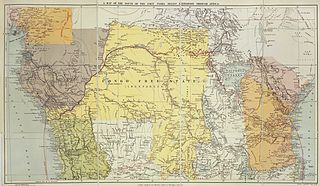
This is a list of European colonial administrators responsible for the territory of the Congo Free State and Belgian Congo (today the Democratic Republic of the Congo).

This is a list of European colonial administrators responsible for the territory of the Congo Free State and Belgian Congo (today the Democratic Republic of the Congo).
Prior to the creation of the Congo Free State, the International Association of the Congo (IAC) had signed treaties with over 300 native Congolese chiefs and in effect exercised sovereignty over a large area of the Congo Basin. The IAC was headquartered in Belgium and run by a committee under the presidency of Maximilien Strauch. Prior to the creation of the office of Administrator-General, authority on the ground in the Congo had been exercised by a Chief of Expedition, who until April 1884 was Henry Morton Stanley. [1]
| Portrait | Name (Birth–Death) | Term of office | Title | Notes | ||
|---|---|---|---|---|---|---|
| Took office | Left office | Time in office | ||||
 | Francis de Winton (1835–1901) | 22 April 1884 | 1 July 1885 | 1 year, 70 days | Administrator-General | |
| Portrait | Name (Birth–Death) | Term of office | Title | Notes | ||
|---|---|---|---|---|---|---|
| Took office | Left office | Time in office | ||||
 | Francis de Winton (1835–1901) | 1 July 1885 | April 1886 | 9 months | Administrator-General | |
 | Camille Janssen (1837–1926) | April 1886 | 17 April 1887 | 6 years, 3 months | ||
| 17 April 1887 | 1 July 1892 | Governor-General | [2] | |||
 | Théophile Wahis (1844–1921) | 1 July 1892 | 15 November 1908 | 16 years, 137 days | Governor-General | |
| Portrait | Name (Birth–Death) | Term of office | Title | Notes | ||
|---|---|---|---|---|---|---|
| Took office | Left office | Time in office | ||||
 | Camille Janssen (1837–1926) | 25 September 1885 | April 1886 | 6 months | Vice Administrator-General | |
 | Herman Ledeganck (1841–1908) | 31 January 1888 | January 1889 | 11 months | Vice Governor-General | [3] |
 | Henri Gondry (1845–1889) | January 1889 | 18 May 1889 | 4 months | Acting Vice Governor-General | [4] |
 | Camille Coquilhat (1853–1891) | 1890 | 24 March 1891 | 0–1 years | Vice Governor-General | [5] |
 | Théophile Wahis (1844–1921) | 15 April 1891 | 1 July 1892 | 1 year, 77 days | Vice Governor-General | [6] |
 | Francis Dhanis (1861–1909) | 4 September 1896 | 1897 | 0–1 years | Vice Governor-General | |
 | Émile Wangermée (1855–1924) | 11 April 1897 | 1 December 1897 | 234 days | Vice Governor-General | |
 | Alphonse van Gèle (1848–1939) | 1 December 1897 | 10 January 1899 | 1 year, 40 days | Vice Governor-General | |
 | Paul Costermans (1860–1905) | January 1904 | March 1905 | 1 year, 2 months | Vice Governor-General | |
 | Félix Fuchs (1858–1928) | 25 December 1902 | 4 March 1904 | 1 year, 70 days | Governor-General ad interim | |
| 1907 | 1908 | 0–1 years | Vice Governor-General | |||
 | Albert Lantonnois van Rode (1852–1934) | May 1905 | 1906/7 | 1–2 years | Vice Governor-General | |
| Portrait | Name (Birth–Death) | Term of office | Title | Notes | ||
|---|---|---|---|---|---|---|
| Took office | Left office | Time in office | ||||
 | Théophile Wahis (1844–1921) | 15 November 1908 | 20 May 1912 | 3 years, 187 days | Governor-General | |
 | Félix Fuchs (1858–1928) | 20 May 1912 | 5 January 1916 | 3 years, 230 days | Governor-General | |
 | Eugène Henry (1862–1930) | 5 January 1916 | 30 January 1921 | 5 years, 25 days | Governor-General | |
 | Maurice Lippens (1875–1956) | 30 January 1921 | 24 January 1923 | 1 year, 359 days | Governor-General | |
 | Martin Rutten (1876–1944) | 24 January 1923 | 27 December 1927 | 4 years, 337 days | Governor-General | |
 | Auguste Tilkens (1869–1949) | 27 December 1927 | 14 September 1934 | 6 years, 261 days | Governor-General | |
 | Pierre Ryckmans (1891–1959) | 14 September 1934 | 31 December 1946 | 12 years, 108 days | Governor-General | |
 | Eugène Jungers (1888–1958) | 31 December 1946 | 1 January 1952 | 5 years, 1 day | Governor-General | |
 | Léo Pétillon (1903–1996) | 1 January 1952 | 12 July 1958 | 6 years, 192 days | Governor-General | |
 | Hendrik Cornelis (1910–1999) | 12 July 1958 | 30 June 1960 | 1 year, 354 days | Governor-General |
On 1 July 1960, the Belgian Congo became independent as the Republic of the Congo (République du Congo).

The Belgian Congo was a Belgian colony in Central Africa from 1908 until independence in 1960 and became the Republic of the Congo (Léopoldville). The former colony adopted its present name, the Democratic Republic of the Congo (DRC), in 1964.

The Congo Free State, also known as the Independent State of the Congo, was a large state and absolute monarchy in Central Africa from 1885 to 1908. It was privately owned by King Leopold II, the constitutional monarch of the Kingdom of Belgium. In legal terms, the two separate nations were in a personal union. The Congo Free State was not a part of, nor did it belong to Belgium. Leopold was able to seize the region by convincing other European states at the Berlin Conference on Africa that he was involved in humanitarian and philanthropic work and would not tax trade. Via the International Association of the Congo, he was able to lay claim to most of the Congo Basin. On 29 May 1885, after the closure of the Berlin Conference, the king announced that he planned to name his possessions "the Congo Free State", an appellation which was not yet used at the Berlin Conference and which officially replaced "International Association of the Congo" on 1 August 1885. The Free State was privately controlled by Leopold from Brussels; he never visited it.

The International Association of the Congo, also known as the International Congo Society, was an association founded on 17 November 1879 by Leopold II of Belgium to further his interests in the Congo. It replaced the Belgian Committee for Studies of the Upper Congo which was part of the International African Association front organisation created for the exploitation of the Congo. The goals of the International Congo Society was to establish control of the Congo Basin and to exploit its economic resources. The Berlin Conference recognised the society as sovereign over the territories it controlled and on August 1, 1885, i.e. four and half months after the closure of the Berlin Conference, King Leopold's Vice-Administrator General in the Congo, announced that the society and the territories it occupied were henceforth called "the Congo Free State".

Lieutenant-General Baron Théophile Wahis was a Belgian soldier and colonial civil servant who served as Governor-General of the Congo Free State and, subsequently, the Belgian Congo for two terms between 1891 and 1912. He was the longest ruling of Belgian colonial governors.

Émile Antoine Marie Wangermée (1855–1924) was a Belgian civil servant and vice governor-general of Congo Free State from 11 April 1897 until December 1897.

Captain Camille-Aimé Coquilhat (1853–1891) was a Belgian soldier, explorer and colonial civil servant who finished his career as Vice Governor-General of the Congo Free State from 1890 until his death in 1891. He was notably an associate of Henry Morton Stanley during his expeditions in the Haut-Congo during the mid-1880s.

Kasai District was a district of the Congo Free State, Belgian Congo and the Democratic Republic of the Congo, named after the Kasai River. It was formed around 1885 and went through several large changes in extent in the years that followed. The 1933 version of the district roughly corresponded to the former Kasai-Occidental province and the present Kasaï and Kasaï-Central provinces.

The Léopoldville riots were an outbreak of civil disorder in Léopoldville in the Belgian Congo which took place in January 1959 and which were an important moment for the Congolese independence movement. The rioting occurred when members of the Alliance des Bakongo (ABAKO) political party were not allowed to assemble for a protest and colonial authorities reacted harshly. The exact death toll is not known, but at least 49 people were killed and total casualties may have been as high as 500. Following these riots, a round table conference was organized in Brussels to negotiate the terms of Congo's independence, The Congo received its independence on 30 June 1960, becoming the Republic of the Congo.

Herman Thomas Marie Ledeganck was a Belgian diplomat and colonial administrator who served as vice governor-general of the Congo Free State from 1888 until 1889. Ledeganck was born in Zomergem the son of a Flemish poet.
Henri Ernest Gondry was a Belgian civil servant and colonial administrator who served as inspector-general and acting vice governor-general of the Congo Free State briefly in 1889.

Alphonse van Gèle, also written van Gele or Vangele, was a Belgian soldier who served as the Vice-Governor General of the Congo Free State from December 1897 until January 1899. He established the Equator Station, or Station de l’Équateur, today Mbandaka, and concluded a treaty with the powerful Zanzibar trader Tippu Tip at the Stanley Falls station, today Kisangani. He is known for having confirmed that the Uele River was the upper part of the Ubangi River.

The Districts of the Congo Free State were the primary administrative divisions of the Congo Free State from 1885 to 1908. There were various boundary changes in the period before the Congo Free State was annexed by Belgium to become the Belgian Congo.

The Lobaye River is a river of the Central African Republic, a right tributary of the Ubangi River.

Charles Adolphe Marie Liebrechts was a Belgian soldier, explorer and administrator in the Congo Free State.

Léon-Charles-Édouard Hanolet was a Belgian soldier, explorer and colonial administrator. He is known for his explorations in 1894–1895 in what is now the Central African Republic, which led to an agreement between France and Belgium that the Ubangi-Mbomou rivers would form the boundary between their territories. He defended the Lado Enclave against the retreating Mahdist forces in 1898.

Mokoangai or Mokuangai was a colonial station in the Congo Free State on the Ubangi River, beside the Mokoangai rapids. Above the station the Ubangi could easily be navigated up to Yakoma, where the Mbomou River and Uele River combine to form the Ubangi.

The En Avant (Forward) was a small steam launch used in the early days of European exploration of the Congo River basin. It was carried in sections past the cataracts of the lower Congo, reassembled at Stanley Pool and launched in December 1881, the first powered vessel on the long navigable section between the cataracts and the Stanley Falls . In the years that followed it played an important role in exploring the Congo river system and carrying Europeans up and down the river and the tributaries as they established trading stations.
The following lists events that happened during 1889 in the Congo Free State.